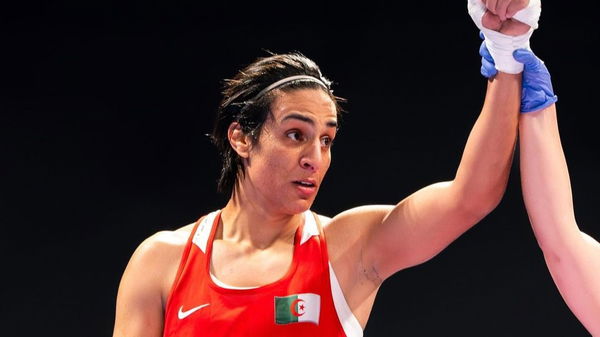
via Imago
Image Source: Imane Khelif (Instagram)

via Imago
Image Source: Imane Khelif (Instagram)
The gender debate is raging again in the Olympics. Cries of unfairness rang out from some quarters of the boxing community. This time, it involves two boxers, Algeria’s Imane Khelif and Taiwan’s Lin Yu-ting, who had been earlier disqualified by the International Boxing Association (IBA) from the Women’s World Boxing Championship after failing testosterone and gender eligibility tests. However, the International Olympic Committee (IOC) allowed them to participate in this year’s Olympics as women after conducting their own tests. The decision has sparked outrage in many circles of the boxing community.
To add fuel to the fire, Imane Khelif defeated Italian female boxer Angela Carini in 46 seconds of the Round of 16 Women’s 66 kg competition at the Olympics. After landing several punches in the first few seconds, Khelif connected with Carini’s nose, prompting her to return to her corner, withdrawing from the bout. After the winner was announced, the Italian fell to her knees and sobbed. “I am a fighter. My father taught me to be a warrior. When I am in the ring, I use that mindset,” Carini said later. “This time, I couldn’t make it.”
Since then, many have been claiming that Khelif is a biological male and, hence, should not be allowed to compete in the women’s category. As of now, there exists no proof of them being biologically male other than the findings from the IBA. Meanwhile, it remains to be seen what happens on Friday when Lin Yu-ting steps inside the ring. As the controversy rages on, here is how gender eligibility tests are conducted in the Olympics by the IOC to determine the biological sex of a person.
ADVERTISEMENT
Article continues below this ad
The IOC introduced gender testing in 1968 and made it mandatory for female athletes, primarily to prevent men from competing in women’s events, thereby avoiding anyone having an unfair advantage. However, mandatory gender testing was officially stopped in 1999. The IOC and other major sports bodies now use hormone testing to determine eligibility for athletes at major sporting events. The sex determination tests are done by a series of gynecologists, endocrinologists, psychologists, and internal medicine specialists. The athletes might also undergo an additional blood test to examine their sex hormones, genes, and chromosomes.
View this post on Instagram
Amidst the routine tests conducted on a sportsperson, testosterone levels are one of the crucial indicators of whether the said individual can compete against female athletes. According to the current rules, a person has to have testosterone levels below 10 nmol/L for a period of one year to be eligible to compete in women’s Olympic events. This regulation has been in effect since the 2012 Olympics and reflects a shift from mandatory, universal gender testing to case-by-case evaluations.
This test is only administered when the Chief Medical Officer of a National Olympic Committee or a member of the IOC’s medical board asks for it. Testosterone testing is done in addition to chromosome testing, which determines whether a person has XX (female) or XY (male) chromosomes. However, there are gray areas in chromosomal testing because sometimes, other combinations are possible, which may not result in a clear male or female confirmation.
What’s your perspective on:
Are gender tests in Olympic boxing fair, or do they undermine the spirit of the sport?
Have an interesting take?
Gender testing in the IBA that disqualified Imane Khelif and Lin Yu-ting
The International Boxing Association (IBA) disqualified Imane Khelif and Lin Yu Ting from the 2023 Women’s World Championships after both athletes failed the organization’s gender eligibility tests at the Women’s World Boxing Championships. The president of IBA, Umar Kremlev, informed the media that both athletes failed the chromosome tests, with results returning XY (male) chromosomal pairing.
ADVERTISEMENT
Article continues below this ad
“Based on DNA tests, we identified a number of athletes who tried to trick their colleagues into posing as women. According to the results of the tests, it was proved that they have XY chromosomes. Such athletes were excluded from competition,” Kremlev told Russia’s Tass news agency.
It must be noted that the IOC has already barred the IBA from organizing boxing events for the Paris 2024 Olympics. This decision stems from ongoing concerns regarding the IBA’s governance, financial transparency, and issues with refereeing and judging systems, which corruption scandals have marred since the 2016 Rio Olympics. Thus, findings made by the IBA are in no case acceptable to the IOC, which has been directly looking into boxing at the 2024 Paris Olympics.
View this post on Instagram
ADVERTISEMENT
Article continues below this ad
Regarding the controversy surrounding Imane Khelif and Lin Yu-ting, both athletes have always competed as women, and have never identified as biologically male, transgender, or intersex. Nonetheless, it presents a conundrum difficult to solve for various boxing organizations and the International Olympic Committee. At this time, speculations and allegations are rife, and we can only wait for more accurate scientific methods to root out such alleged injustices or unfairness in sports. What do you think about this incident? Let us know in the comments below.
ADVERTISEMENT
ADVERTISEMENT
ADVERTISEMENT
ADVERTISEMENT


Are gender tests in Olympic boxing fair, or do they undermine the spirit of the sport?